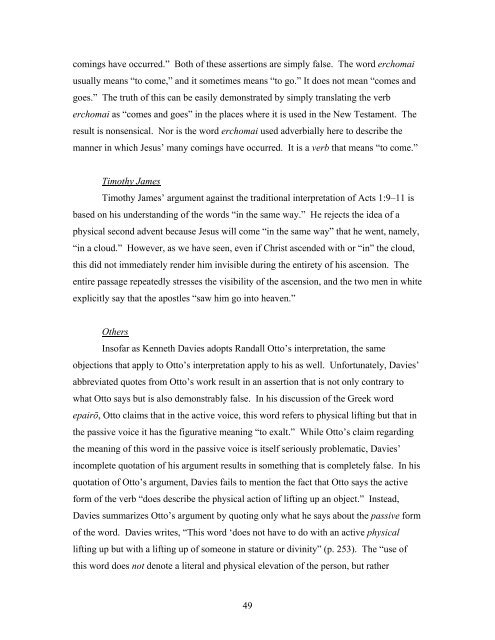Acts 1:9-11 and the Hyper-Preterism Debate by Keith A. Mathison
Acts 1:9-11 and the Hyper-Preterism Debate by Keith A. Mathison
Acts 1:9-11 and the Hyper-Preterism Debate by Keith A. Mathison
Create successful ePaper yourself
Turn your PDF publications into a flip-book with our unique Google optimized e-Paper software.
comings have occurred.” Both of <strong>the</strong>se assertions are simply false. The word erchomai<br />
usually means “to come,” <strong>and</strong> it sometimes means “to go.” It does not mean “comes <strong>and</strong><br />
goes.” The truth of this can be easily demonstrated <strong>by</strong> simply translating <strong>the</strong> verb<br />
erchomai as “comes <strong>and</strong> goes” in <strong>the</strong> places where it is used in <strong>the</strong> New Testament. The<br />
result is nonsensical. Nor is <strong>the</strong> word erchomai used adverbially here to describe <strong>the</strong><br />
manner in which Jesus’ many comings have occurred. It is a verb that means “to come.”<br />
Timothy James<br />
Timothy James’ argument against <strong>the</strong> traditional interpretation of <strong>Acts</strong> 1:9–<strong>11</strong> is<br />
based on his underst<strong>and</strong>ing of <strong>the</strong> words “in <strong>the</strong> same way.” He rejects <strong>the</strong> idea of a<br />
physical second advent because Jesus will come “in <strong>the</strong> same way” that he went, namely,<br />
“in a cloud.” However, as we have seen, even if Christ ascended with or “in” <strong>the</strong> cloud,<br />
this did not immediately render him invisible during <strong>the</strong> entirety of his ascension. The<br />
entire passage repeatedly stresses <strong>the</strong> visibility of <strong>the</strong> ascension, <strong>and</strong> <strong>the</strong> two men in white<br />
explicitly say that <strong>the</strong> apostles “saw him go into heaven.”<br />
O<strong>the</strong>rs<br />
Insofar as Kenneth Davies adopts R<strong>and</strong>all Otto’s interpretation, <strong>the</strong> same<br />
objections that apply to Otto’s interpretation apply to his as well. Unfortunately, Davies’<br />
abbreviated quotes from Otto’s work result in an assertion that is not only contrary to<br />
what Otto says but is also demonstrably false. In his discussion of <strong>the</strong> Greek word<br />
epairō, Otto claims that in <strong>the</strong> active voice, this word refers to physical lifting but that in<br />
<strong>the</strong> passive voice it has <strong>the</strong> figurative meaning “to exalt.” While Otto’s claim regarding<br />
<strong>the</strong> meaning of this word in <strong>the</strong> passive voice is itself seriously problematic, Davies’<br />
incomplete quotation of his argument results in something that is completely false. In his<br />
quotation of Otto’s argument, Davies fails to mention <strong>the</strong> fact that Otto says <strong>the</strong> active<br />
form of <strong>the</strong> verb “does describe <strong>the</strong> physical action of lifting up an object.” Instead,<br />
Davies summarizes Otto’s argument <strong>by</strong> quoting only what he says about <strong>the</strong> passive form<br />
of <strong>the</strong> word. Davies writes, “This word ‘does not have to do with an active physical<br />
lifting up but with a lifting up of someone in stature or divinity” (p. 253). The “use of<br />
this word does not denote a literal <strong>and</strong> physical elevation of <strong>the</strong> person, but ra<strong>the</strong>r<br />
49

















